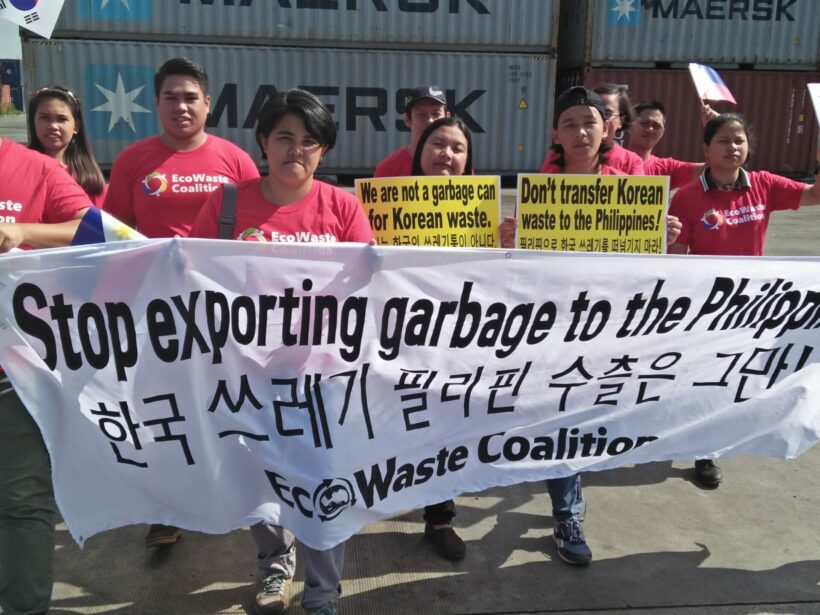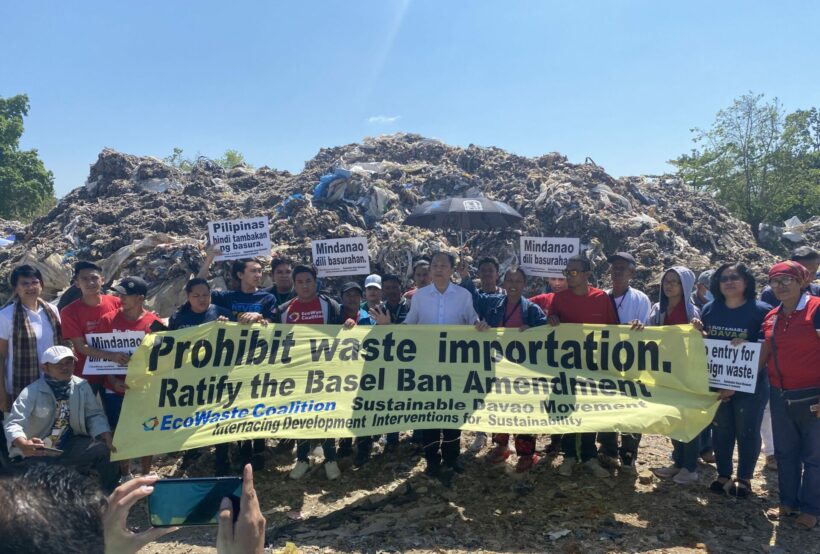8 June 2023, Quezon City. Environmental health and justice groups lauded the Government of Thailand for joining the global efforts to control unwanted imports of hazardous waste and other wastes by ratifying the Basel Convention Ban Amendment.
Thailand accepted the amendment in March 2023, becoming the 102nd party to ratify the agreement. ASEAN member states Malaysia, Brunei and Indonesia ratified the agreement in 2001, 2002, and 2005, respectively. The Philippines and other countries in the region have yet to ratify the agreement, which already entered into force in 2019.
Thailand’s acceptance of the amendment banning the export of hazardous waste and other wastes from developed to developing countries drew cheers from public interest groups and rekindled calls for the Philippines and other countries to ratify the agreement and not fall behind.
“We applaud Thailand for its action and exhort our government and others not to drag their feet any longer,” said Aileen Lucero, National Coordinator, EcoWaste Coalition. “The ratification of the Basel Convention Ban Amendment, the implementation of the Basel Convention Plastic Waste Amendments, and the national prohibition on waste importation, we believe, will offer our country with formidable legal protection against the illegal traffic of hazardous and other wastes.”
Last January 2022, in observance of Zero Waste Month, the trustees and staff of the EcoWaste Coalition wrote to President Ferdinand Marcos, Jr. urging him to ratify the Basel Convention Ban Amendment as current laws and regulations are not adequate to protect the national interest from the damaging effects of the global waste trade to public health and the environment. They cited high-profile cases of illegal waste imports, especially those from Canada and South Korea.

EcoWaste Coalition’s members in Mindanao make a stand against foreign waste dumping in the Philippines.
According to Atty. Mark Peñalver, Executive Director of the Interfacing Development Interventions for Sustainability (IDIS) and Vice-President of the EcoWaste Coalition: “The Thai government’s ratification of the Basel Convention Ban Amendment is laudable as this will strengthen their fight against foreign waste dumping. Our government should immediately follow suit and avoid being left behind. It has been established that our ratification of the agreement, which is long overdue, will be beneficial for our nation’s interest. There is no justification for further inaction.”
It will be recalled that a study commissioned by the Department of Environment and Natural Resources – Environmental Management Bureau (DENR-EMB) “has shown the overall beneficial impact of the Ban Amendment in the Philippines, where the long-term financial, environmental, and social benefits outweigh the short term-costs.”“The Thai ratification of the Basel Convention Ban Amendment sends a strong message to other countries that the government is serious about preventing toxic and problematic wastes from entering their country. This bold action should encourage other countries in Southeast Asia to address the increasing impacts of hazardous waste trade on people’s health and the environment,” said Chinkie Peliño-Golle, Regional Coordinator, International Pollutants Elimination Network – Southeast and East Asia (IPEN-SEA).
“Thailand’s ratification of the Basel Convention Ban Amendment is a significant step towards ending much of the waste export scourge and we commend the Thai government for taking this vital step. We hope to see our government tighten the implementation of waste trade regulations to prevent illegal imports,” said Punyathorn Jeungsmarn from the Ecological Alert and Recovery – Thailand (EARTH).
“Waste colonialism is a problem shared by all countries in Southeast Asia, especially following China’s ban on waste import in 2018. It is important for our region to stand strong against hazardous waste from more economically developed nations. Therefore, we hope to see the ratification of the Basel Convention Ban Amendment across all countries of Southeast Asia,” he added.
“All Basel Parties and non-Parties such as the United States must now cease their efforts to flood Thailand, and indeed all of Southeast Asia with toxic and problematic wastes, such as plastic and electronic wastes,” said Jim Puckett, Executive Director of Basel Action Network, a global waste trade watchdog organization. “Today, Thailand has sent a strong and crystal-clear message — Asia will no longer be a dumping ground for the effluent of the affluent countries.”
References:https://www.earththailand.org/
https://www.basel.int/






